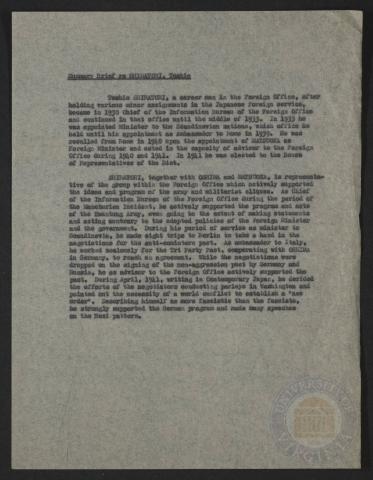
Page 1
| Parent | Summary Brief about Toshio Shiratori |
|---|---|
| Date | |
| Language | English |
| Collection | Roy L. Morgan Papers |
| Box | Box 3 |
| Folder | 1946 [IMFTE] (IPS) Translations of interrogations. |
| Repository | University of Virginia Law Library |
Summary Brief re SHIRATORI, Toshio
Toshio SHIRATORI, a career man in the Foreign Office, after holding various minor assignments in the Japanese foreign service, became in 1930 Chief of the Information Bureau of the Foreign Office and continued in that office until the middle of 1933. In 1933 he was appointed Minister to the Scandinavian nations, which office he held until his appointment as Ambassador to Rome in 1939. He was recalled from Rome in 1940 upon the appointment of MATSUOKA as Foreign Minister and acted in the capacity of advisor to the Foreign Office during 1940 and 1941. In 1941 he was elected to the House of Representatives of the Diet.
SHIRATORI, together with OSHIMA and MATSUOKA, is representative of the group within the Foreign Office which actively supported the ideas and program of the army and militarist cliques. As Chief of the Information Bureau of the Foreign Office during the period of the Manchurian Incident, he actively supported the program and acts of the Kwantung Army, even going to the extent of making statements and acting contrary to the adopted policies of the Foreign Minister and the government. During his period of service as minister to Scandinavia, he made eight trips to Berlin to take a hand in the negotiations for the anti-comintern pact. AS ambassador to Italy, he worked zealously for the Tri Party Pact, cooperating with OSHIMA in Germany, to reach an agreement. While the negotiations were dropped on the signing of the non-aggression pact by Germany and Russia, he as advisor to the Foreign Office actively supported the pact. During April, 1941, writing in Contemporary Japan, he derided the efforts of the negotiators conducting parleys in Washington and pointed out the necessity of a world conflict to establish a “new order.” Describing himself as more fascistic than the fascists, he strongly supported the German program and made many speeches on the Nazi pattern.
